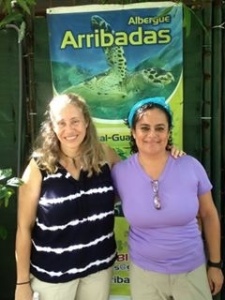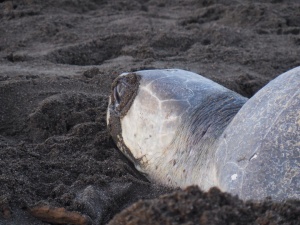OSTIONAL, Costa Rica – What does it take to dedicate your life to the preservation of another?
According to Wendy Cruz, director of the Estación Biomarina Arribadas in Playa Ostional, the answer is love.
“Our nature is to love. Humans were made for love, I think,” Cruz said. “If people love themselves they’re going to love everything. You can’t teach someone to love something else if they don’t know love.”

In early August, Wendy Cruz (right) educated visiting biology professor Heather Kalb of West Liberty University and her class on the history, anatomy and protection of sea turtles in Ostional. Photo credit Wendy Cruz
If Cruz’s size was proportional to the amount of caring inside of her, she would tower over Shaquille O’Neal. Instead, the overflowing love is crammed into her shorter frame, bouncing out of her curls and smile with every word and action. Though some might complain about the overwhelming humidity in the Costa Rican beach towns that makes each movement a struggle, Cruz simply sweats happiness. She accepts the constant assault of mosquitoes and invading sand from the beach, quite content in her home away from home.
Cruz, age 43, runs a small school in her albergue, or lodge, near the beach, educating between five and 40 students at a time alongside volunteer professors who teach various subjects such as economics, biology, geography and most importantly, about the sea turtles that regularly emerge from the ocean to lay their eggs on the beach.
But Cruz hasn’t always been focused on the life of the turtles and conservation education. In 1993, she earned a degree in economic sciences from the Universidad de Costa Rica and started her own consulting business. Tragedy was necessary to bring her to Playa Ostional to realize her passion.
When her parents were caught in a flash flood on the road to Ostional and killed six years ago, Cruz left her home, husband, and two children in San José to take over her parents’ work. Since 1993, Edgar Cruz and Sonia Sevilla had been trying to establish a large station in Ostional to learn and educate others about the turtles and sustainability.
Coming to Ostional was not easy for Cruz, not only because she had just lost her parents – Cruz was pregnant and due any moment, and coming from the city life, was having a hard time adjusting to the “eternal Saturday” coastal culture. Caught up in her grief, she felt cut off from the world, and was only saved by the arrival of the turtles.
“I remember that I was crying out because of the accident, and I didn’t see that they (the turtles) were there, I was just crying and crying and I had this thing that I had to cry out, and all of a sudden the arribada was there,” Cruz said. “But there was no sense to stay there crying when there were all these turtles there… The turtle was there and I was there and the moment was there; we just fell in love.”
The turtles’ arrival helped Cruz adopt a sort of “turtle philosophy” – a way of looking at the world with love.
“When you’re feeling so bad, sometimes you close yourself to the beautiful things that are outside,” Cruz said. “If you are not taught properly how to show your love, if you have misconceptions about loving, if you are in this kind of situation when a very bad thing happens to you, you cannot react fast to life again. But if you were taught properly how to show your loving to everything—nature, animals, people—when something bad happens you can react. You are going to survive.”
And survive Cruz did. Fueled by her newfound passion for the turtles and her desire to carry on with her parents’ project, and seeing the need to educate people, she sought out information wherever she could find it. Eventually this path led her to María Teresa Koberg, who was influential in the establishment of El Parque Nacional Marino Las Baulas and the protection of the leatherback turtles.
Though Koberg, known as Teté, was dying, Cruz still approached her for help.
“I told Teté, ‘Look, Teté, I just landed in here, my name is Wendy, I love the turtles… How can I do this better?'” Cruz said. “And she cried, because … all the leatherbacks alive now are because of her. She saved them.”
In her failing health, Tete gave Cruz piles of books to read and learn from – Cruz calls them her “turtlecologist bibles.” Cruz was in demand to teach “from day one,” so she had to read and absorb the knowledge fast.
“By reading, I found out that you don’t just love the turtles because it is a very enigmatic animal. You love the turtles because it’s something that you have in you, it’s a connection,” Cruz said. “And when I found out that turtles come from the ocean to land, it is like when you interiorize yourself, to your soul, to the ocean inside of you.”

“Now I know why everybody loves the turtles! Love at first sight. And if you have love at first sight, it’s very easy to do the rest. You just get it, everywhere, like an antenna,” said Wendy Cruz. Photo by Elizabeth Eaton
People began to find Cruz and her small school via social networks, and she started to educate all who came to her. She recruited volunteer professors to educate teens to toddlers on marine biology, anthropology, art and history. Cruz developed a class on sustainable economy, which she continues to teach.
“We keep the hope that kids dream, and they see things better,” Cruz said. “They keep studying, and they keep contributing to the community.”
Cruz especially feels that way about her own children; though she does not wish to impose her dreams on others, she thinks that because her children have seen the beauty of Ostional, which “is like heaven to them,” they will be inspired to pursue conservation work.
No matter what they choose to do, however, Cruz will support her children, who she calls her three baby dragons because they had to grow up strong without her around all the time.
“They had to defend themselves in school without their mommy,” Cruz said.
Initially, it was hard for Cruz to be separated from her family, but as the years have passed and more volunteers have come, lessening the load on her shoulders, she and her husband have been able to organize more time together. This is much appreciated by her kids – as shown by the excited cries of “Mamá! Mamá!” and the patter of running feet when she returns home.
Just as her parents taught her, Cruz teaches her own children and students what she believes to be one of the most imortant things: a love of nature.
On a short excursion to go tidepooling with a group of journalism students, Cruz did not simply peer into the water, searching for creatures; with no hesitation, she sat down in a shallow pool, immersing herself in that world. Completely comfortable amidst the sharp, cutting lava rocks and gentle, salty waves, she admired the tiny violet fish who came to investigate her.
Along with the respect and caring for the environment she wants her students to have, Cruz wants them to understand how they impact nature. People produce trash, but do not always acknowledge their trash and the damage that it causes, as well as their “trash mentality” of excessive consumption.
“I would make all the environmental ‘damagers’ go and pick all the trash every day, hot under the sun, and in the rain, take care of the monkeys, and the deer; we can really do a lot of things with people who have lost that sensibility,” Cruz said. “Because I think it’s a loss of sensibility, even to themselves. If they see the damages, they will really stop doing it.”
Propped against a wall in her lodge is a board covered with litter Cruz has found on the beach, serving as a constant reminder of the harm that humans are capable of.
“They are not taking responsibility for the impact of their existence on other creatures, and on themselves,” Cruz said. “And that is what I want people to do, to put a little baby turtle on their heart and start thinking, how can I compensate for just being me, existing.”
Now, six years after she started teaching, Cruz is filled with pride in her students, many of whom have taken her teaching to heart and tried in their own ways to share the knowledge.
“I can see them on the Internet, making movies, making documentaries, writing blogs, passing it to others,” Cruz said. “People before who didn’t even care — now they are ferocious activists for marine turtles.”
The dream that Cruz’s parents had for Ostional has started to become a reality, though a lack of trained teachers keeps her from establishing the large station that was her parents’ goal. The locals have embraced ecotourism and are better trained in guiding and informing tourists, and are more knowledgeable about living sustainably.
“When you hear people, you see people have a need,” Cruz said. “They don’t want to be sick, they don’t want to be stressed, they don’t want to pollute, but they don’t know how to not do it. When you look for ways to help them, you find a way to teach them.”
Cruz is now an influential conservationist and teacher, touching lives both human and animal, inspiring people to think before they pollute, and above all else, loving.
“I am a fulfilled person,” Cruz said. “By losing it all, and being very sad, and recovering it. I am a turtle now. I am one of them.”
Discussion
No comments yet.